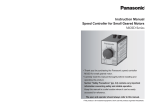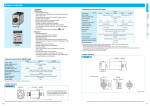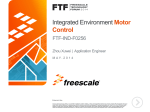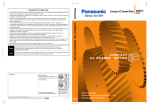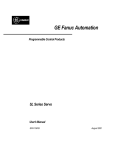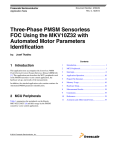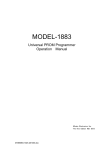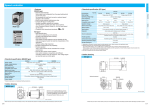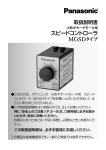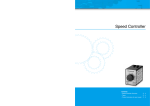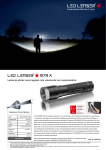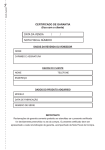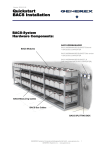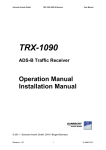Download Instruction Manual Speed Controller for Small Geared
Transcript
Instruction Manual Speed Controller for Small Geared Motors MGSD Series • Thank you for purchasing the Panasonic speed controller MGSD for small geared motor. • Carefully read this manual thoroughly before installing and operating the product. Section "Safety Precautions" (pp. 3-9) contains very important information concerning safety and reliable operation. Keep this manual in a safe location where it can be easily accessed for reference. The user and operator should always refer to this manual. This product is for industrial equipment.Don't use this product at general household. Safety Precautions • Contents page Safety Precautions........................................................... 3 1. Introduction................................................................. 10 Unpacking............................................................................... 10 General description of the speed controller............................ 10 2. Names and functions................................................. 14 3. Installation.................................................................. 15 4. Wiring diagram........................................................... 17 Considerations for wiring........................................................ 17 Wiring diagram........................................................................ 18 Standard electrical wiring diagram.......................................... 20 Speed change only............................................................. 20 Unidirectional rotation and electric brake........................... 22 Normal/reverse rotation and electric brake......................... 24 Peripheral wiring..................................................................... 26 Motor wiring with cooling fan motor (F) or thermal protector (TP)..... 26 Wiring to electromagnetic brake......................................... 27 5. Options........................................................................ 28 6. References.................................................................. 32 7. Compatible with international standards................. 38 8. Specification............................................................... 42 9. Inspection and maintenance..................................... 44 Inspection............................................................................... 44 Troubleshooting...................................................................... 45 Please strictly observe safety precautions described below to prevent personal injury and property damage. ■The below explains what will happen if someone fails to heed a particular precaution statement. Danger Indicates hazards or unsafe practices which could result in severe personal injury or death. Caution Indicates hazards or unsafe practices which could result in minor personal injury or product or property damage. ■The following symbols are used to describe the type of Do and Don't. This symbol is used to indicate a practice that shall not be attempted. This symbol is used to indicate a practice that shall be done. 10. After-Sale Service (Repair)...................................... 46 –2– Please observe safety precautions fully. –3– Safety Precautions Please observe safety precautions fully. Danger Don't use the speed controller in or near environment containing water, corrosive gas, flammable gas or flammable material. Don't place flammable materials near the motor (including the controller). Use overcurrent protection device, ground-fault circuit interrupter, overtemperature protecting device, and emergency stop device. After an earthquake, first verify safety. To prevent possibility of fire. Don't make soldering joint on a round pin of the speed controller. Don't damage leadwires or subject leadwires to excessive stress such as strong pressure, heavy object and clamping load. Failure to heed these requirements will result in electric shock, personal injury or fire. Before transferring, wiring or checking product, disconnect the power source for safe isolation. Incomplete power disconnection will cause electric shock. Securely install the equipment to prevent bodily injury or fire in case of earthquake. Failure to heed these requirements will result in electric shock, personal injury, fire, malfunction or damage. Will cause electric shock, malfunction or damage. Provide emergency stop circuit externally for instantaneous interruption of operation and power supply. Don't use the controller in a place subject to excessive vibration or shock. Will cause electric shock, personal injury or fire. Install the unit to a nonflammable construction (e.g. metal). Installation on a flammable material may cause fire. Don't remove the speed controller setting knob. Will cause burn injury or electric shock. Don't touch rotating member of the motor. Will cause personal injury. Installation area should be free from excessive dust, and from splashing water and oil. Don't touch potentially hot motor casing. Will cause burn injury. Failure to heed this precaution will result in electric shock, personal injury, fire, malfunction or damage. Don't attempt to carry out wiring or manual operation with wet hand. Will cause electric shock, personal injury or fire. Correctly run wirings to the tacho-generator. Incorrect wiring will result in short circuit, electric shock, personal injury, etc. Wiring work should be done by a qualified electrician. Wiring work done by an inexperienced person will cause electric shock. Turn off power upon power interruption or activation of overtemperature protecting device. Unpredictable restarting will cause personal injury. Don't use leadwires soaked in water or oil. –4– –5– Safety Precautions Please observe safety precautions fully. Install the equipment in the control board and keep the terminal block and protect it from inadvertent contact. Failure to heed this precaution will result in electric shock, personal injury, fire, malfunction or damage. After correctly connecting leadwires, insulate the live parts with insulator. Incorrect wiring will result in short circuit, electric shock, fire or malfunction. Ground the motor ground to the earth. Floating ground circuit will cause electric shock. Caution Don't move the product by holding leadwires or motor shaft. Don't put the machine into unstable operation. Once power failure occurs, don't come close to the machine that will unexpectedly start upon recovery of the power. Provide secure mechanism so that the restarting of the machine will not cause personal injury. Don't apply excessive shock to the motor shaft. Don't apply excessive shock to the product. Don't get on the product. Don't place heavy object on the product. –6– Failure to heed these precautions will cause bodily injury. Don't lock the motor shaft while the motor is running. Don't clog or put an object into the radiating hole of the motor. Don't turn off and on power so frequently. Don't pull leadwires with an excessive force. Don't use the equipment in highly intensive electric field. Don't use the equipment under direct sunshine. Locked motor will cause fire, electric shock, or malfunction. Failure to heed this instruction will result in fire. Failure to heed this instruction will result in fire, personal injury, malfunction or damage. Failure to heed this instruction will cause fire, electric shock or personal injury. Failure to heed these instructions will cause personal injury or fire. Don't use the equipment in an environment where electrostatic voltage potentials may be produced. Induced malfunction will cause malfunction or personal injury. Don't drop or cause topple over of something during transportation or installation. Failure to heed this instruction will result in personal injury or malfunction. Failure to heed this instruction will cause fire, electric shock or malfunction. Failure to heed this instruction will result in electric shock, personal injury, fire, malfunction or damage. Don't use a variable transformer or transformer having capacity insufficient to feed the load. Excessive shock will cause failure. Don't use the equipment outside the limits described on the nameplate and user's manual. Failure to heed this instruction will result in electric shock, personal injury, fire, malfunction or damage. Never attempt to perform modification, dismantle or repair. –7– Failure to heed this instruction will cause fire, electric shock or personal injury. Safety Precautions Please observe safety precautions fully. Perform installation by taking into consideration the mass of the body and rated output of the product. Adjust ambient environmental condition of motor and speed controller to match the motor operating temperature and humidity. Exactly follow the installing method and direction specified. Use the speed controller in combination with the specified motor. Connect the motor electromagnetic brake control relay in series with a ground-fault interrupter, circuit breaker and relay so that they turn off the circuit upon emergency stop. Failure to heed these instructions will result in personal injury or malfunction. Failure to heed this instruction will result in fire. Lack of connection will cause malfunction. Test-run the securely fixed motor without loading to verify normal operation, and then connect it to the mechanical system. Operation using a wrong model or wrong wiring connection will result in personal injury. Level of input voltage to the speed controller should correspond to the motor rated voltage. Operation from a voltage outside the rated voltage will cause electric shock, personal injury or fire. Provide protection device against idling of electro-magnetic brake or gear head, or grease leakage from gear head. Lack of protection will cause personal injury, damage, pollution or fire. –8– Don't place any obstacle object around the motor and peripheral, which blocks air passage. Temperature rise will cause burn injury or fire. Correctly run and arrange wiring. Maintenance must be performed by an experienced personnel. Wrong wiring will cause personal injury or electric shock. Always keep power disconnected when the power is not necessary for a long time. Improper operation will cause personal injury. Scraps must be treated as industrial waste. –9– 1. Introduction Unpacking Designation and rating on the nameplate · Verify that the model No. matches your order sheet. · Damage in transit is not found. Should you find any discrepancy in the product, consult your local dealer. General description of the speed controller The MGSD type speed controller is designed to operate with a small geared motor to adjust and vary its speed. The speed is adjusted from the speed setting knob. The input voltage can be single-phase 100-120 VAC, or single-phase 200 – 240 VAC. The speed controller is compatible with EC directive and UL standard. Compatible with DIN terminal block which is convenient to install on the distribution board, and small timer common option available from Panasonic Corporation (pp. 32 – 37). Read this manual thoroughly so that you will become gradually acquainted with the excellent features of your speed controller for small geared motor and understand how to fully utilize these functions. The speed controller is designed to be integrated into a general control board. The product must be handled by experienced personnel familiar with the product. Rated input voltage Input current Rated speed Rated output Serial No. (production No.) Model No. Input Input Current Rated Speed Rated Output SPEED CONTROLLER MGSDB2 50/60Hz 1Ph 200–240V 1.0A 1400/1700min–1 6–90W Ser.No. 06110001G C58401 Made in China Description of model No. M G S D B 2 1–4 Output 100 V 200 V 5 Series A : 3 – 40 W B : 60 – 90 W B : 6 – 90 W 6 Input power supply 1. Single phase 100 – 120 VAC 2. Single phase 200 – 240 VAC Serial number (production No.) The Ser. No. on the nameplate contains the following codes. Example Ser.No. * 06 11 0001 * Sequential number Manufacturing month Manufacturing year This product was manufactured in November 2006 and assigned a sequential number 0001. – 10 – Model name – 11 – 1. Introduction Motor Part Number Rating M 9 1 Z 9 0 G V 4 L G 1,2 3 4 Size M6: Sq.60 mm M7: Sq.70 mm M8: Sq. 80 mm M9: Sq. 90 mm Series 1 : Induction motor R : Reversible motor Series X : 40 W or lower Z : 60 W or higher 5,6 7 8 Output Shape of shaft G : Pinion S : Round 9 10 11 Model No. Output Power supply No. of poles Variable speed V : Variable (without brake) BV : Variable with electromagnetic brake Voltage L : 100 V D : 110 – 115 V Y : 200 V G : 220 – 230 V Version Blank : Pinion shaft motor (Japanese standard) S : Round shaft motor (Japanese standard) G : International standard approved motor (CE, UL, CCC) Compatible induction motor M61X***V4** MGSDA1 3-40 W AC100 V to AC120 V M71X***V4** M81X***V4** M91X***V4** MGSDB1 60-90 W M91Z***V4** M61X***V4** AC200 V MGSDB2 6-90 W to AC240 V M71X***V4** M81X***V4** M91X***V4** M91Z***V4** – 12 – – 13 – Compatible reversible motor Compatible reversible motor with electromagnetic brake M6RX***V4** M6RX**GBV4** M7RX***V4** M7RX**GBV4** M8RX***V4** M8RX**GBV4** M9RX***V4** M9RX**GBV4** M9RZ***V4** M6RX***V4** M6RX**GBV4** M7RX***V4** M7RX**GBV4** M8RX***V4** M8RX**GBV4** M9RX***V4** M9RX**GBV4** M9RZ***V4** 2. Names and functions Terminal block locking hook mounting hole 3. Installation Terminal block locking claw Nameplate Installation location (1) Indoors free from rain and direct sunlight: the product is not of a waterproof construction. (2) Free from vibration 4.9 m/s2 or more; shock, dust, iron powder or oil mist; splash of water, oil and grinding fluid; and away from flammable materials, corrosive gas (H2S, SO2, NO2, Cl2, etc.) or flammable gas. (3) Well ventilated dry and clean location containing negligible amount of oil or dust. Environmental condition Caution plate Speed control knob <Rear panel> Pin Item Condition Operating temperature –10 °C – 50 °C Storage temperature –20 ˚C – 60 ˚C Operating humidity 90 % RH or below (no dewing) Allowable vibration 4.9 m/s2 or below (10 Hz – 60 Hz) Altitude 1000 m max. Pin number Terminal block locking claw – 14 – – 15 – 3. Installation 4. Wiring diagram Installing method The product can be mounted in either of the following two ways but must be installed inside the control board. Orientation of the product in the control board is not limited. • Using flush mounting frame (sold separately: see p. 34) • Using miniature DIN terminal block (sold deparately: see pp. 32 and 33) Terminal block Flush mounting frame DIN rail Mounting plate For further information, consult the manufacturer of terminal block. Caution Special care is always given to our products during manufacturing and delivery to keep quality from deteriorating. Customer is also required to keep the quality by designing and providing failsafe and safety operating field and condition so that external noise, electrostatic charge, wrong wiring, wrong parts are prevented or eliminated. In rare instances, the product may give off fume like a smoke of a cigarette if it is in a specific malfunctioning state. Precaution against possible fumes should be taken into consideration when the product is used in a clean room, etc. DON'T Don't turn the shaft of speed control potentiometer using a tool with the knob removed. – 16 – Considerations for wiring •Use a terminal block or socket for connection. Do not solder the lead to the pin. •When using a transformer or variable transformer, its capacity must be larger than the rated current of the product by the factor of 2 or more, to assure reliable operation. •If the input lead is longer than 1 m (e.g. lead from a tachometer generator), seal it or replace it with shielded cable to prevent induction of noises. <Precautions> •Don't ground the shielding. •The length of the wiring between the speed controller and the motor should be 3 m or shorter. •Wiring from the tachometer generator (TG) carries current at a high voltage: Risk of electrical shock. •When using a cooling fan motor or a motor with thermal protector, also see p. 26. High voltage is applied to the potentiometer: Danger! – 17 – 4. Wiring diagram Wiring diagram Speed control knob •The motor speed can be adjusted from the speed setting knob on the controller front panel. •The thick continuous lines represent main circuit. Use conductor of size 0.75 mm2 (AWG 18) or larger for the main line. •The thin continuous lines represent signal circuit. Use conductor of size 0.3 mm2 (AWG 22) or larger in the signal circuit. When the distance from the tachometer generator (TG) is long, use shielded twisted pair cable. This knob adjusts the rotating speed of the motor from 90 (min–1) to 1400/1700 (min–1) at 50/60 Hz. 65 Miniature DIN terminal block AT7803: Panasonic See Section 6. References. 4 3 <Caution> Do not ground the shielding material. Molded case circuit breaker (MCCB): 5 A <Caution> Power supply 100 V system: 1ø100 – 120 V 200 V system: 1ø200 – 240 V <Precautions> The input voltage must be in the range of rated voltage compatible with the motor specification. Install ground-fault circuit interrupter in the power supply. Install a noise filter and surge absorber to protect against external noise and lightning surge. Noise filter Surge absorber (option) 7 8 1 2 TG White Gray Black Pink Pink Capacitor cap Motor Capacitor (supplied with the motor) Power switch Ground the return circuit to the earth terminal. Should be class D earthing (100 Ω or less, ø1.6 mm or more). – 18 – Ground the return circuit to the earth terminal. Should be class D earthing (100 Ω or less, ø1.6 mm or more). Tightening torque: 1.0 – 1.5 N·m – 19 – For wiring connection of the capacitor, see the motor instruction manual. 4. Wiring diagram Standard electrical wiring diagram Normal/reverse rotation Speed change only SW1 Speed controller 2 1 Feed motor rated voltage CW White Gray 7 Black 3 6 Capacitor 4 Motor Speed controller Unidirectional rotation 8 SW1 2 1 8 7 3 6 4 Spark killer R1 C1 CW CCW Feed motor rated voltage White Gray SW2 Black Capacitor R1 C1 Spark killer Pink 5 Pink 5 Pink TG Pin No. <Precautions> SW1 Run Stop ON OFF <Note> Rotating direction viewed from shaft end CW Clockwise CCW Counterclockwise This wiring diagram causes the motor to rotate clockwise when viewed from the motor shaft end. To run the motor counterclockwise, interchange the connecting point of black and gray leads. – 20 – Pink TG SW1 100 V supply system 5 A or more at 125 VAC SW2 200 V supply system 5 A or more at 250 VAC Spark killer R1+C1 Pin No. Motor DV0P008A (option) For optional accessories, see p. 30. When using independent relay contacts for SW2 to change over normal/reverse, interlock both contacts so that they will not close simultaneously. Normal SW1 SW2 * • To change rotation direction of induction motor ON CW Stop Reverse OFF * ON CCW SW1: Power switch SW2: Normal/Reverse selector switch Provide a motor halt period. Switch over SW2 after complete stop of the motor. • To change rotation direction of reversible motor A motor halt period is not necessary. Switch over SW2 while keeping SW1 turned ON. When configuring SW2 with relay contacts, use a relay having large gap between contacts (e.g. HL relay: Panasonic) to prevent malfunction due to short-circuited capacitor. – 21 – 4. Wiring diagram Unidirectional rotation and electric brake 40 W or higher <Precautions> 2 1 25 W or less SW1 2 1 Feed motor rated voltage Speed controller CW White 7 8 3 6 4 Gray Spark killer Black C1 RUN R1 SW2 STOP STOP SW3 RUN R2 Motor Capacitor External braking resistor Pink Pink TG 5 Pin No. <Note> This wiring diagram causes the motor to rotate clockwise when viewed from the motor shaft end. To run the motor counterclockwise, interchange the connecting point of black and SW1 100 V supply system 5 A or more at 125 VAC gray leads. SW2 200 V supply system 5 A or more at 250 VAC SW3 Spark killer R1+C1 External braking resistor R2 10 mA at 10 VDC DV0P008A (option) DV0P003 (option) For option, refer to p. 29, p. 30 onward. – 22 – Speed controller •The number of start/stop operations should be 6/min. or less. 8 RUN SW1 External braking resistor R2 STOP SW2 Black C1 Spark killer 7 6 4 5 STOP SW3 Capacitor Pin No. Motor White Pink RUN Pink Braking <Precautions> When SW2 and SW3 are switched from RUN to STOP, electric braking is applied for approx. 0.5 sec., and the motor stops instantly. Difference in switching time between SW2 and SW3 must be 0.1 sec. or smaller. CW Gray R1 3 Feed motor rated voltage Run SW1 SW2 SW3 Stop TG Braking Run ON RUN STOP RUN SW1: Power switch SW2: RUN/STOP switch SW3: Braking start switch <Precautions> If SW2 is in RUN position while SW3 is in STOP, abnormal operation occurs (full speed rotation for a short time; or if SW3 is in RUN position while SW2 is in STOP, motor temperature rises excessively. – 23 – 4. Wiring diagram Normal/reverse rotation and electric brake 40 W or higher <Precautions> SW1 2 1 •The number of start/stop operations should be 6/min. or less. External braking resistor SW1 Speed controller 2 1 Spark killer 7 8 C1 R1 SW2 RUN 3 6 4 5 STOP STOP SW3 RUN Feed motor rated voltage White CW CCW SW4 Gray CW Black SW5 R2 CCW External braking resistor Capacitor Pink Rotating direction viewed from shaft end Pin No. CW Clockwise CCW Counterclockwise SW1, SW2 100 V supply system 5 A or more at 125 VAC SW4, SW5 200 V supply system 5 A or more at 250 VAC SW3 10 mA at 10 VDC Spark killer R1+C1 DV0P008A (option) External braking resistor R2 DV0P003 (option) For option, refer to p. 29, p. 30 onward. – 24 – Motor TG Pink Speed controller 25 W or less 8 RUN STOP SW2 6 4 5 CW R2 CCW C1 CW SW4 Gray SW5 Black R1 Motor Capacitor Spark killer 7 3 CCW Feed motor rated voltage White STOP SW3 RUN Pink Pink Normal SW1 Pin No. <Precautions> Braking When SW2 and SW3 are switched from RUN to STOP, electric braking is applied for approx. 0.5 sec., and the motor stops instantly. Difference in switching time between SW2 and SW3 must be 0.1 sec. or smaller. SW2 SW3 SW4 SW5 <Precautions> TG Braking Stop Reverse ON RUN CW 0.7 sec. or longer STOP RUN CCW SW1: Power switch SW2: RUN/STOP switch SW3: Braking start switch SW4, SW5: Normal/Reverse selector switch If SW2 is in RUN position while SW3 is in STOP, abnormal operation occurs (full speed rotation for a short time; or if SW3 is in RUN position while SW2 is in STOP, motor temperature rises excessively. <Precautions> Never attempt to change direction (SW4, SW5) while motor is running or electric brake is being applied. – 25 – 4. Wiring diagram Wiring to electromagnetic brake (40 W or below) Motor wiring with cooling fan motor (F) or thermal protector (TP) Speed controller The thermal protector (TP) is an automatic reset type. To prevent hazards caused by restarting of TP, operate it by connecting wiring as shown below. Don't connect TP directly to the power supply. Ry 1 2 Pin No. Connect the cooling fan motor (F) across pins (1) and (2) on the power terminal. SWA SWB Ry Motor (M) and tacho-generator (TC) should be connected according to corresponding wiring diagram (pp. 20-25). Gray TG(Pink) Closed Ry ON Closed Feed motor rated voltage ON Run Closed RUN SW9 Yellow SW A Relay Ry 100 V supply system AC125 V 5 A or more 200 V supply system AC250 V 5 A or more DV0P008A (option) For option, refer to p. 30 onward. <Precautions> 1. Operate SW9 simultaneously with RUN/STOP switching of other switches, if any. 2. For remaining wirings, refer to corresponding wiring diagram. Continue Momentary N.O. contact 100 V supply system 200 V supply system Momentary N.C. contact AC125 V 5 A or more 3a contact AC125 V 5 A or more 3a contact – 26 – Brake SW9 Once the TP operates, cooling period is required until the operation can start. SW B Motor SW1 Spark killer R1+C1 Closed ON TP Closed Feed motor rated voltage SW B TG Closed Open STOP R1 Yellow Ry Relay F Closed C1 Pin No. TP Blue or yellow TP F(Black) F(Black) SW A SW1 2 1 Spark killer TP Blue or yellow Black M White Ry Variable speed motor with electromagnetic brake should be wired as shown below. Speed controller Peripheral wiring – 27 – 5. Options <Note> Tachometer (DV0P001) This tachometer is especially designed to operate with our speed controller so that it can provide easier displaying of motor speed. Unit: mm Pink 4 48 ±0.3 Pink TG 5 48 ±0.3 ±1 2–ø3.5 hole Motor ø5 4 Speed controller TM Panel cutout drawing Pin No. Calibrate the scale of the tachometer (TM) from the potentiometer on the rear panel. 1. While running the motor at its full rotation speed without load, adjust to 1450 min–1 if power supply is at 50 Hz, or 1750 min–1 if 60 Hz. 2. Monitor the output signal of the TG on an oscilloscope and determine the frequency. And adjust: rotating speed N (min–1) = 5 x f (Hz) Caution: Since the circuit is not isolated from the power supply, use an insulated tool such as an insulated screwdriver to protect against electric shock. External braking resistor (DV0P003) 5.6 Ω 10 W max40 Potentiometer for calibration ø3.8 12 <Precautions> – 28 – 33 ±3.0 0.5 4.8 ±0.5 (ø2.5) (2.2) · Connect the tachometer in parallel with the tachometer generator (TG). · If the tachometer (TM) requires longer connection cable, use shielded twisted pair cable. Don't ground shielding of the cable. · Accuracy of tachometer readings will depend on variation in motor performance and operating environment (temperature and noise). The tachometer should be used as a rough indicator. 3 9 +–13 48 14 ±1 10.5 ±1.5 2–M3 Mounting screw 10.5±1.5 8 ±1 12.2 48 ±2 0.8 8.5 6 ±0.5 65 Unit: mm 48 60 Input terminal <Precautions> (0.6) The resistance of DV0P003 is 5.6 Ω. When using commercially available resistor, choose 4.7-6.8 Ω, 10 W or larger. – 29 – 5. Options Surge absorber (DV0P4190) ø4.2 ±0.2 ø0.8 17.5±1 (Interval between center) R1 = 10 – 200 Ω (1/4 W or larger) C1 = 0.1 – 0.33 μF (AC250 WV) 41 ±1 Noise filter (DV0P3611-5) 7.0 Terminal cover (clear) 5.0 53.1 ±1.0 Octal pin socket (DV0P4560) Type AW68102: Panasonic 4 0.7 3.5 38 49 2–ø4.5 <Circuit diagram> 1 L R Cx Cy 6-M4 (11.6) (13.0) 8.9 4 2–ø4.5 x 6.75 3 Cx Cy 2 4 – 30 – Unit: mm (7.5) – 31 – 5 10.0 Mark i ng (l abel ) 5 12.0 50.0 60.0 2.0 33 3 2 8 Unit: mm 100.0 ±2.0 88.0 75.0 1 Type SUP-EQ5-ER-6: Okaya Electric Industries Co., Ltd. 4.5 ±0.5 28 ±1 C1 UL-1015 AWG16 +30 200 –0 The capacitance of capacitor in the DV0P008A is 0.1 μF and the resistance of the internal resistor is 120 Ω. When using commercially available spark killer, choose one consisting of the following parts: R1 <Circuit diagram> ø28.5 <Precautions> Unit: mm 28.5 ±1 20min 17±1 Unit: mm 5.5 ±1 11 ±1 8±1 6 20±1 Type R.A.V-781BWZ-4: Okaya Electric Industries Co., Ltd. 7 Spark killer (DV0P008A) 0.1 µ F 120 Ω 6. References DIN rail terminal block (8-pin) (ATC180031) Noise filter Type MR-2043: NEC Tokin Corporation 49 10 Unit: mm M3.5 4–ø4.5 35.5 E 70 Marking (label) 27 2.5 3.6 x 4.8 12 The following common timer option is available through your local agent for Panasonic. Miniature DIN terminal block (AT7803) Locking hook Compact timer protection cover (AT7881) Unit: mm 1 Unit: mm ø14 ø30 ø31.4 Unit: mm – 32 – 8 26 (34.6) 11.6 40 8P cap (AD8013) 1 41 37.2 8.6 M3.5 45.6 24.5 71 • To prevent contact failure and loose connection, positively engage the locking hooks. 4 Option common to compact timers: Panasonic ø32.5 Unit: mm 24 19 50 33 40 10 50 40 1. Prevents accidental operation after speed setting and also serves as a dustproof cover. 2. Use the cover together with the flush mounting frame described later. – 33 – Rear panel terminal block (AT78041) Unit: mm 21 38 16 6. References Flush mounting frame: Panasonic Part No. ordered AT7851 H type K type Control board mounting Mounting hole dimensions (unit: mm) surface, front view Gray AT7852 Black AT7853 Silver gray AT7811 Gray AT7812 Black AT7813 Silver gray AT7821 MHP type Color Gray AT7822 Black AT7823 Silver gray 50.5 48 +0.5 0 43.5 58 53 ±0.3 Gray R2 or below 39 ±0.3 74 53 ±0.3 Distance between parallel holes 11 mm or more R2 or below 39 ±0.3 Distance between parallel holes 13 mm or more 2–ø4.5 88 76 +0.1 53 ±0.3 R2 or below 39 ±0.3 Compatible panel thickness 1.0-3.5 mm – 34 – +0.5 0 Distance between parallel holes 6.5 mm or more 50 58 MHP-M type AT7831 R2 or below – 35 – Distance between parallel holes 21 mm or more 6. References (3) Engage the hook with the base to fix it to the mounting frame. Installing Arm (1) Insert the mounting frame from the front panel of the cutout. Hook [Note] 8P cap Arm [Note] As the body touches the mounting frame rib, push upper and lower hooks in the direction of arrow for locking. For connecting wirings, use 8P cap (AD8013) and rear panel terminal block (AT78041). Hook Insertion of the mounting frame with the body into the panel is impossible. (2) After mounting the frame on the panel, insert the body from the rear. Rear panel terminal block Mounted state Protection cover Mounting frame A C – 36 – B 34.6 Dimension Dimension Dimension A B C H type K type 14.2 52.8 16.2 MHP type MHP-M type 15.7 51.3 17.7 – 37 – 7. Compatible with international standards EC directives UL/CE Certification EC directives cover all general consumer electronics having specific functions and to be directly delivered to European Union (EU). These electronic products must meet safety standards commonly applicable to all EU member nations, and must bear CE marking. Our speed controllers are compatible with standards referenced by Low Voltage Directive so that the machines and devices incorporating these controllers will meet requirements of EC directives. Conformance to EMC directives Our speed controllers have been verified to conform to standards associated with EMC directives by testing them using application models (conditions) representing typical installations and wiring with which these controllers will be used. Of course, it is impossible to simulate all actual operating conditions (e.g. wiring and grounding). Therefore, any equipment incorporating our speed controller should be checked on the items required by EMC directives (especially, unwanted radiation, noise, terminal voltage, etc.). Pursuant to at the directive 2004/108/EC,article 9(2) Panasonic Testing Centre Panasonic Service Europe, a division of Panasonic Marketing Europe GmbH Winsbergring 15,22525 Hamburg,F.R.Germany UL UL508 Installation condition Standard Standard for industrial control devices such as motor control E228869 EN50178 Electronic/electrical devices used in electric power facilities (Low Voltage Directive) EN55011 Radio interference wave characteristics of high-frequency devices for industrial, scientific and medical application EN61000-6-2 Immunity standard for industrial environment (EMC directive) IEC61000-4-2 Electrostatic discharge immunity test CE IEC61000-4-3 Radio frequency radiation field immunity test IEC61000-4-4 Electrical high speed transient burst immunity test IEC61000-4-5 Lightning surge immunity test IEC61000-4-6 High-frequency conductivity immunity test IEC61000-4-11 Instantaneous power interruption immunity test – 38 – File No. – 39 – Overvoltage Category II Class II device Pollution degree 2 – 7. Compatible with international standards Peripherals layout practices Recommended circuit breakers · 100 V system: 1-p 100-120 V ±10 %, 50/60 Hz 200 V system: 1-p 200-240 V ±10 %, 50/60 Hz Power source · Use it in environment of overvoltage category II specified in IEC 60664-1. · When using in overvoltage category III environment, connect an insulating transformer conforming to EN standard or IEC standard to the input of the speed controller. · Electric wire size should be compatible with EN 60204-1. Circuit breaker or fuse Noise filter Connect a specified UL and IEC standard approved circuit breaker or UL approved fuse between the power source and the noise filter. This configuration meets requirements of UL508 (file No.E228869). When using two or more speed controllers together with one noise filter, consult the noise filter manufacturer. Surge absorber Connect a surge absorber to the primary side of the noise filter. Disconnect the surge absorber before conducting withstand voltage test of machine/device to protect the surge absorber. Ground Connect the protective earth (PE) to the motor and noise filter connected to the speed controller. Speed controller and peripherals Product Noise filter Surge absorber Option part No. Manufacturer part No. - DV0P4190 MR-2043 R.A.V-781BWZ-4 – 40 – Manufacturer NEC Tokin Corp. Okaya Electric Industries Co., Ltd. Sensata Technologies, Inc. Type single-phase: IELH-1-11-63-5A-M Rated current 5 A, current breaking characteristic DELAY63 Recommended current breaking characteristic: DELAY61-63 Installation environment Use the speed controller in pollution degree 2 or 1 as specified in IEC60664-1. (Example: Installed the controller in IP54 control board) Control board Circuit breaker Power supply or Noise filter TG Speed controller M Motor fuse Surge absorber Capacitor Protective earth (PE) Protective earth (PE) * The length of connection cable between the speed controller and motor should be shorter than 3 m. Manufacturer of peripherals Manufacturer Okaya Electric Industries Co., Ltd. As of September 2014 TEL East Japan : 03-4544-7040 West Japan : 06-6341-8815 East Japan : 03-3515-9151 West Japan : 06-6263-6781 0120-101-550 049-283-7575 NEC Tokin Corporation Panasonic Corporation Sensata Technologies, Inc. – 41 – 8. Specification General specification Compatible motor output Speed control range Speed variations (against load) Speed setting Braking *1 Electric braking time Parallel running Equipment weight ø1 100 VAC – 120 VAC Unit: mm Rated voltage ±10 % 50 Hz/60 Hz 1.0 A 2.0 A 3 W – 40 W 1.0 A 60 W – 90W 50 Hz : 90 – 1400 min–1 60 Hz : 90 – 1700 min–1 6 W – 90W 67.1 36 14.2 60 Hz 50 Hz 1700 1400 1000 Speed will vary depending on variation in motor performance and operating conditions (temperature, noise). 500 0 59 Rated input current MGSDB2 ø1 200 VAC – 240 VAC 50 Supply voltage permissible variable range Power supply frequency MGSDB1 ø20 Power source MGSDA1 No. of revolutions (min–1) Part No. Dimensions • Speed controller 0 2 4 6 8 Controller graduation 5 % (standard) 1000 min-1, Amount of change in speed at 80 % rated toque Internal Active while electric braking current is flowing 0.5 s (standard) Amount of braking current is 2-3 times the rated current. Not applicable 80 g *1 Electric braking has no mechanical brake holding mechanism. Reversible motor has simple continuous sliding brake which will provide certain mechanical holding function. To provide further brake holding, use our C&B motor (unidirectional only) or variable speed motor containing electromagnetic brake. When braking a load having excessively high inertia, durability and life expectancy of motor shaft and gear should be taken into consideration. Use the motor within the allowable inertia. – 42 – – 43 – 9. Inspection and maintenance Inspection Troubleshooting Periodically check and maintenance to assure safe and reliable operation of the speed controller. Practical considerations for checking and maintenance Turning off/on of power supply must be done by the personnel responsible for the maintenance work. If a problem occurs with your system, use the following procedure for locating and remove the cause. In the event the problem cannot be isolated or the speed controller is suspected, or if you have any questions, please contact us or your local agency. Motor won't run hecking items and period of maintenance work Under normal operating condition Ambient temperature (annual average) 30 °C, 100 % load factor, 20 hours max./day Perform daily check and periodic check as shown below: Category Frequency Check for • Ambient temperature, humidity, dust, dirt, foreign material • Unusual vibration, shock, sound • Main circuit voltage Daily check Every day • Smell • Contaminated pin • Damaged wiring • Loose connection (motor, devices) • Misalignment • Foreign matters on load Periodic check Once/year • Excessively overheating motor <Precautions> The frequency specified for periodic check should be changed as necessary depending on operating condition. Guideline for replacement No reference can be established since components and parts should be replaced based on operating condition and method. Replace or repair defective or malfunctioning parts. Consult us when it is necessary to DON'T overhaul the assembly. Product Category Life expectancy Remarks Life expectancy is reference for replacement. Speed Electrolytic Approx. Potentially defective part must be replaced controller capacitor 5 years before expected lifetime. Motor, gear See motor instruction manual. – 44 – No Wiring is correct Yes Voltage across pin 1 and 7 changes as the speed setting is changed Yes External noise No Yes Yes No Motor with thermal protector No Yes Thermal protector is active · Thermal protector actuation Prospect of speed controller failure Protect against noise No Proper load factor Review wiring against the wiring diagram (see pp.17–27) No temperature:120–130 °C Yes Noise filter · MR-2043: NEC Tokin Corp. · SUP-EQ5-ER-6 (DV0P3611-5): Okaya Electric Industries Co., Ltd. SUP-EQ5-ER-6 is a recommended noise filter for use in high noise level environment. Reduce the load or use a higher output motor · Halt the process for recovery · Reduce the load or use a higher output motor · Arrange setting so that the motor frame temperature is kept below 90 °C Motor or capacitor fails Motor is running at constant speed Wiring is correct No Yes Using jumper wire, short-circuit pins 2 and 7. No AC voltage (approx. 6.5 V) on pins 4 and 5 Yes Speed controller is at fault – 45 – Review wiring against the wiring diagram (see pp.17–27) · Tachometer generator is faulty · Breaking of interconnecting cable After-Sale Service (Repair) Repair Consult to a dealer from whom you have purchased the product for details of repair. When the product is incorporated to the machine or equipment you have purchased, consult to the manufacuter or the dealer of the machine or equipment. MEMO Cautions for Proper Use • This product is intended to be used with a general industrial product, but not designed or manufactured to be used in a machine or system that may cause personal death when it is failed. • Install a safety equipments or apparatus in your application, when a serious accident or loss of property is expected due to the failure of this product. • Consult us if the application of this product is under such special conditions and environments as nuclear energy control, aerospace, transportation, medical equipment, various safety equipments or equipments which require a lesser air contamination. • We have been making the best effort to ensure the highest quality of the products, however, application of exceptionally larger external noise disturbance and static electricity, or failure in input power, wiring and components may result in unexpected action. It is highly recommended that you make a fail-safe design and secure the safety in the operative range. • Failure of this product depending on its content, may generate smoke of about one cigarette. Take this into consideration when the application of the machine is clean room related. • Please be careful when using in an environment with high concentrations of sulphur or sulphuric gases, as sulphuration can lead to disconnection from the chip resistor or a poor contact connection. • Take care to avoid inputting a supply voltage which significantly exceeds the rated range to the power supply of this product. Failure to heed this caution may result in damage to the internal parts, causing smoking and/or a fire and other trouble. • The user is responsible for checking compatibilities of the unit with the equipment to which it is to be installed and associated parts, in various aspects such as configuration, dimensions, characteristics, life expectancy and regulations. – 46 – – 47 – Technical information Technical information of this product (Instruction Manual, CAD data) can be downloaded from the following web site. http://industrial.panasonic.com/ww/i_e/25000/motor_fa_e/motor_fa_e.html MEMO (Fill in the blanks for reference in case of inquiry or repair.) Date of purchase Model No. MGSD Dealer Tel: ( ) - Panasonic Corporation, Appliances Company, Motor Business Division 7-1-1 Morofuku, Daito, Osaka, 574-0044, Japan Phone : +81-72-871-1212 © Panasonic Corporation 2014 Printed in China IMD98 P0209-3094

























